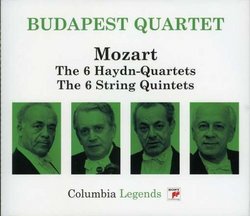Unmissable!
Musicus | Oslo, Norway | 06/13/2005
(5 out of 5 stars)
"Perhaps you should remove one star or two for production values, which are not state of the art; the sound feels very thin, missing quite a lot in body. The playing, however, is the very, very best. The world will never again get a string quartet with such an understanding of Mozart! The tempos are generally brisk, but it never sounds hurried. I am used to the Quartetto Italiano on this stuff, and that quartet played rather slowly, wonderfully as such, but slowly. The Budapest Quartet is playing quickly, but it always feels easy, elegant and relaxed.
The nerve on the quintet K. 516 is very exiting. In spite of being recorded by the mid 40ies, I've never wanted any other recordings of the quintets.
The 'Haydn' quartets are recorded by the mid 50ies, but here I would like some better sound. I've preferred the Quartetto Italiano for almost ten years; now I only listen to the Budapest. I guess that my mind now is able to add the sound which is missing on the recording.
My five stars because you should not miss this - and in some years this collection perhaps will be out of print..."
A knockout bargain
Eloi | Ely, NV USA | 05/22/2005
(5 out of 5 stars)
"How can I review the greatest string quartet ever? The recording is quite decent, a remastering of LPs that were already excellent. Don't think scratchy reissue.
And the performance? My god, these guys are total quartetness--I just listened to the Dissonant Quartet, and there is a rhythmic thrust beyond others, no matter when recorded. The proof is in the astounding gasps--there's no more accurate term--in the last movement. There may have been equally good performances that I'll never know because they were early 20th century, but thanks there are these great performances that got the benefit of good recording.
"
Sumptuous, emblematic and historical performances!
Hiram Gomez Pardo | Valencia, Venezuela | 10/04/2007
(5 out of 5 stars)
"
The set of string quintets fins to Mozart in absolute plenitude of his creative musical skills and refulgent inspiration. He just wrote six works of this nature.
The first point to remark is the fact Mozart is the long interval between the first one and the rest. From 1773 to 1783. By that time he had already written thirteen string quartets and the last six in tandem. That means Mozart was surely persuaded the enormous difficulties of including and additional voice to the string quartet. On the other hand the maturity exhibited in this first work of the set is more than evident. This adagio shows an orchestral structure (as if we were talking about a Concerto for piano, where the additional viola worked out as the soloist instrument).
The quintet in C minor K. 406 anticipates by far, a suggestive orchestral ambiance, pregnant of dramatic approach. In fact, there have been critics who have elated this work with Beethoven's Fifth Symphony in what concerns to the development of fundamental rhythm.
Six years have elapsed among these two K. and we find in this one - K. 515 - a sort of warm return to " a second naivete", joining to mastery and maturity.
The Fourth one K. 516, written in G minor (the fatalistic key per excellence) explains the somber counterpoint and for some, related with "Jupiter" Symphony.
The Fifth Quintet brings further to the last stage of this composer, plenty of what we might an even major level of excel geniality. as a matter of fact, we should realize, that Mozart had composed in his notable K. 563, a true advance of his next works, with the employment of the Fugue as a new departure point to express himself far beyond of the earthly boundaries (We should remind the employment of the same device in Beethoven's last three Sonatas as well as Hammerklavier).
The Last of these memorable works is a Farewell, Mozart is aware the end is near and it's curious to observe how he returns to Haydnish roots; providing the entire work of a level of orchestral expression and brilliant acuity, conjugating workmanship repose, brilliance and a blissful atmosphere.
If we really live Mozart's music and we have not taken into account these admirable and golden works, it's time to get them, because, one of the three best admirable chamber music ensemble of the XX Century, as Budapest string quartet was, achieved certainly one of their most memorable and resplendent musical peaks with this set, so don't hesitate for a moment and acquire it.
Five thousand stars for this extraordinary achievement.
"


 Track Listings (12) - Disc #1
Track Listings (12) - Disc #1